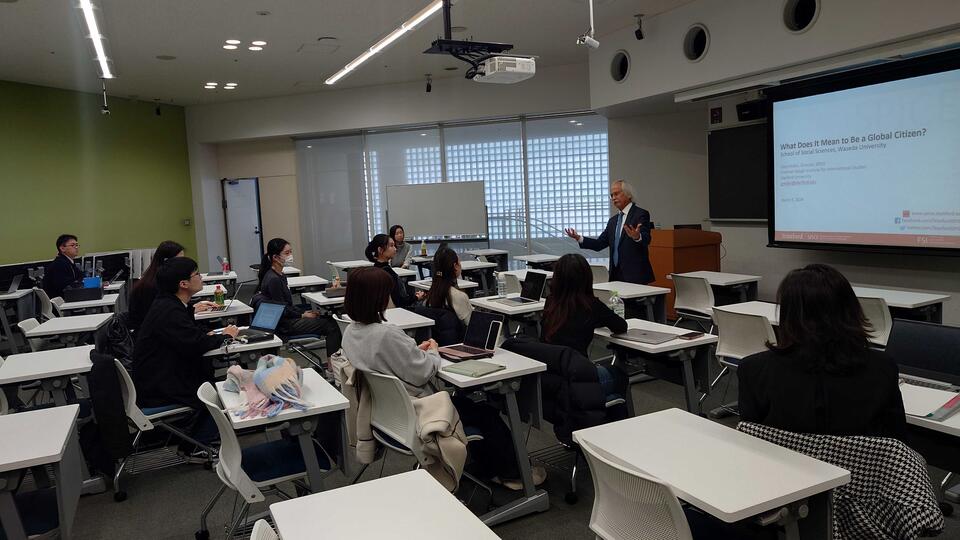Empathy, Respect for Historical Narratives of the Public, and Diversity
Empathy, Respect for Historical Narratives of the Public, and Diversity
Undergraduate student Snow Gai reflects on her experience participating in the SPICE/Stanford–Waseda intensive course.

The following is a guest article written by Snow Gai, a student from China studying at Waseda University in Japan. Snow enrolled in the SPICE/Stanford–Waseda Intensive Course on Diversity and Global Citizenship, which was organized by SPICE and Waseda’s School of Social Sciences and taught by Meiko Kotani. Students from China, Indonesia, Mongolia, and Japan brought diverse perspectives to the course.
At a time when governments, mass media, and dominant ethnic groups hold sway over the prevailing narrative of global society, local communities and minorities in various countries and regions are trying to fight for more space and freedom. This silent yet brutal competition extends from the realm of culture and history to the real-life living environment of society. In addition, this continuous evolution of historical narratives and power declarations is also an epochal and subversive reshaping of the public’s perception of the cultural diversity of mankind.
In the late winter and early spring, when the air was still a bit chilly, I was honoured to be selected, along with several other students from the School of Social Science, to participate in an intensive course on diversity and global citizenship, jointly organized by the Faculty of Social Sciences of Waseda University and the Stanford Program on International and Cross-Cultural Education. The lectures on history and diversity provided by renowned professors from the two schools enriched and broadened our perspectives on history and our understanding of diversity.
Due to space constraints, I would like to present my gains and impressions by extracting two of the lessons that impressed me the most.
The opening lecture was given by the Dean of the Faculty of Social Sciences of Waseda University on the evolution of historical perspectives and peacebuilding. As a student who grew up in and was immersed in the Chinese educational environment, I am certain from my personal experience that the history of World War II in the Pacific region, and in particular the history of China’s “War of Resistance against Japan,” is one of the most important aspects of modern history education in China. However, not only in Japan but also in China, the interpretation of this history has been changing over time. Even without considering the historical context of East Asia, we can also observe that such dynamic changes in historical perspectives occur frequently across different countries and regions around the world. Behind these changes lies the role of history education in shaping collective memories and narratives, and in supporting the legitimacy of regimes—a factor that cannot be ignored. Facing up to these roles of historical narratives is crucial for promoting an independent and objective reading of history by individuals, for deepening understanding of the diversity of values and worldviews, and even for finding windows of dialogue between groups in conflict and for building peace between regions and peoples.

Related to this somewhat abstract and theoretical content, and the lecture that resonated with me the most, was a brief history of East Asian immigration to North America, presented by Dr. Gary Mukai from Stanford, whose own family history made this different interpretation of ethnicity and history particularly meaningful. As one of the most silent and humble peoples in North America, East Asian immigrants have had a profound relationship with the development of this land. Whether it was the Trans-America Railway built by Chinese immigrant labourers, the immigration gate on Angel Island that accepted and rejected countless visitors from the other side of the Pacific, or the incarceration camps for Japanese Americans during of the Second World War, Asian immigrants have unfortunately not been selected to be crowned and extolled by the mainstream of history despite the remarkable impact they made on the history of this land. In addition to a little bit of indignation and sadness, the other students and I could not help but marvel at the magnitude of the real past outside of the history textbooks.
As someone who has studied for long in the field of peacebuilding and conflict resolution, I am acutely aware of the importance of deepening the public’s understanding of the diversity of historical narratives and the importance of marginalised groups in the work of national reconciliation and peacebuilding. Through this colourful short-term experience I was fortunate to have the opportunity to stop briefly in the midst of a multitude of official news and narratives, and go behind the scenes of the history stage with my peers, tracing back and witnessing the true and great role of the general public in the river of time.
At the end, I would like to thank once again the staff from the Faculty of Social Sciences and other departments at Waseda University, as well as the instructors and professors from SPICE, and the lovely students from across the ocean who made video calls with us and expressed together their empathy for life. We ourselves are the creators of a truly diverse society and the meaning of our existence, and this valuing of diversity will benefit the wider community and our future.
To stay informed of SPICE news, join our email list and follow us on Facebook, X, and Instagram.



